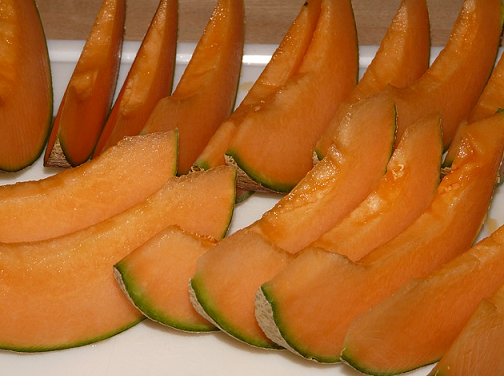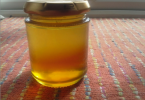Today’s question: can dogs eat cantaloupe? Is cantaloupe good or bad for dogs? Scroll down for detailed questions.
Melon is a great fruit to enjoy throughout the year. The variety of melon allows most people to enjoy at least one of these fruits throughout the year! As doctors encourage us to eat more fruit, and eat an array of colors from fruit sources, we are naturally drawn to the melon family. Melons are relatively safe foods, given the outer shell of the melon is not eaten. The outer shell contains the fruit and keeps the eatable area safe from chemicals, bacteria, and any pesticides that may be used. Melons are also whole foods, free from preservatives and other additives that many may find to be allergens.
Cantaloupe is a part of the melon family that is popular among most that enjoy fruit. Cantaloupe is eaten with all meals, all season, and around the world. Cantaloupe is not simply a breakfast food or a snack; cantaloupe may be added into all meals and snacks. The portability of cantaloupe itself is great, after the cantaloupe has been sliced and put into a container. The actual melon is a bit heavy and cannot be eaten right away given the outer shell and protective barrier. However, when the melon is sliced, the fruit may be enjoyed anywhere! With or without silverware, and with or without a table, the portability of cantaloupe makes this fruit the perfect snack or addition to your daily meals.
Cantaloupe is one of those fruits that are very popular during the summer months. Do to the great taste, the sweetness that reminds you of summer, and the added water content of melon, fruit is a great source of hydration and nutrients during the hot summer months. You love your cantaloupe and your four-legged friend knows that very well! S/he will look at you with a great appetite when you are slicing this good-looking juicy fruit.
Should we mention that he will also want a slice of the cantaloupe as well? On a picnic, your dog will likely ask for his/her share of the melon for lunch. On a walk, a piece of melon may be a good way to keep your pup hydrated if there is not much time to stop for water breaks. But! Before you go ahead and offer him/her such a treat, do you know the answer to the question: can dogs eat cantaloupe?
Can Dogs Eat Cantaloupe – What Do Experts Say?
Yes, you can feed cantaloupe to your pooch.
Since dogs eat most anything, dog owners may be quick to offer their dog’s fruit as both a treat and as an addition to their diets. Giving your dog a few slices of cantaloupe seems like a harmless thing to do. Moreover, offering melon to your dog seems like a healthy treat for them too. According to ASPCA, this fruit is not toxic to dogs, cats and horses. Cantaloupe is not a dangerous food as long as you are not feeding it to dogs excessively. Otherwise, their stomachs and digestive tracts can get hurt. However, every dog is different and some may tolerate human foods better than others.
When you begin to offer a type of food to your dog, always begin with small amounts. If you wish to begin offering cantaloupe to your dog, start by first giving him/her a small slice. You can start with small amounts, just to see if your dog can tolerate it. Watch for any observable behaviors that seem out of the ordinary. Check with your vet to be sure that your particular dog is able to eat cantaloupe without issue. In the event you vet gives the ‘ok’ to cantaloupe and your dog does not seem to suffer side effects, you may increase his/her serving size of the melon.
Only increase the serving a bit, and only offer the fruit on occasion. Dogs are not meant to ingest melon regularly and this food is not a natural addition to their diet needed for survival. The vitamins and minerals your pup requires are sourced through their dog food, not from human food.
There are many benefits to eating cantaloupe, and your dog may enjoy the taste, flavor, and texture. You as the owner will enjoy the added hydration and vitamins that derives from such a wonderful melon. This fruit is loaded with anti-inflammatory properties, as well as other benefits for your pet’s health, which we are going to talk about in the following paragraphs.
How Much Cantaloupe Should I Feed to My Dog?
As we mentioned earlier, how much cantaloupe to feed your dog is really all about the amounts of fruit given to your dog. Cantaloupe should be a refreshing and healthy treat given on occasion, and only as long as the melon will not cause any diarrhea. Cantaloupe should be fed to your dog occasionally and after you are sure there are not any side effects to be had. Human food should certainly not be the main food in his/her diet, only an occasional addition recommended or approved by your vet. Couple 1-2 inch wedges should be fine for your pup. However, it depends on the size of your dog.
The downside to offering your pup cantaloupe is that fruit contains a great amount of sugar. We all know fruit contains a high amount of sugar, which accounts for the sweet taste of fruit that we all love. Sugar from fruit is not as ‘bad’ as sugar from a candy bar; however, dogs do not need any added sugar in their diets. Too much sugar eaten by your dog will cause weight gain, obesity, and possibly diabetes.
If your dog suffers from diabetes, you should definitely avoid this treat altogether. The great amount of sugar it contains will only worsen his condition and you certainly do not want that to happen. Dogs need to have their blood sugar kept low just as their humans do. Monitoring the amount of sugar your dog ingests in just as important as any other task you do to provide a healthy life for your pet.
Another reason to be mindful when feeding your dog cantaloupe is that the melon does not contain the vital ingredient your dog needs in his/her diet, which is protein. Your dog benefits from eating foods outside of the protein category, but when feeding your dog, you should stay within his/her most evolved characteristic as far as food sources. Dogs need to eat meat, from meat sources, and have a diet high in protein. Offering melon may switch the diet up a bit and add little extra vitamins in other areas, but the fruit is not deemed necessary because of the low protein count.
This fruit can be given to your furry friend, but only in moderation. The fruit is non-toxic, free from choking hazards, and does not cause indigestion or other stomach complications. The water content of the melon is the best feature and one of the only true benefits to your pup. For instance, if the weather outside is hot, you could give your dog a slice to help him/her cool off a bit and prevent dehydration. Offering your dog bacon on a hot day does not offer this benefit, so sticking with cantaloupe is the best idea in this regard.
Nutritional Value
Usually, the digestive tract of a dog is much faster than the digestive tract humans possess, but this does not mean that they are unable to absorb some gifts offered by Mother Nature. In this case – a cantaloupe, a fruit that contains a very high level of vitamin C and vitamin A. Cantaloupe also contains a large dose of beta-carotene, which is great for eyes, and potassium, folic acid, and fiber.
All of these elements should contain in your pet dog’s daily diet. When it comes to vitamin C, your dog’s body should be able to produce it automatically, under normal circumstances. This does not mean that a slice of cantaloupe cannot be a healthy and enjoyable treat for your pup.
A study has shown that consumption of a vitamin A-rich food like cantaloupe is good for the lungs. Additionally, potassium is important for heart and muscle contraction and also aids in the proper function of the gastrointestinal tract. Vitamin C will strengthen the immune system which is necessary for fighting infection.
You might be surprised to find this out, but cantaloupes are actually a part of the same family as pumpkin and cucumbers, another two foods that bring many benefits to your dog’s health.
Great for Older Dogs
If your dog is old, the anti-inflammatory and antioxidant properties of cantaloupes will help to obtain the necessary amounts of nutrients your furry pal needs. So, this wonderful fruit can easily act as a natural supplement to his diet, too!
How to Serve it?
First of all, you should not allow your dog to lick the outside surface of this fruit because it may contain harmful bacteria such as Salmonella. You should peel it and throw away the seeds too. These could be hard for your dog’s stomach to process.
Depending on your dog but generally one or two slices of cantaloupe should be fine for your pet. However, the amount depends on how big or small your dog is, but in general, he should be okay to begin with a 2-inch wedge.
Afterwards, the only thing remaining for you to do is to see how your pet likes it and if he gets any reaction to it such as diarrhea or upset stomach. This is how you will find out if your dog should be eating this fruit or not.
As a conclusion, dogs can, in fact, eat cantaloupe as long as the amounts that are being served are moderate. It is a source of healthy vitamins and minerals, and you should not miss out the opportunity of offering it to your canine friend. He will certainly appreciate it.
Related articles:
References:








Leave a Comment